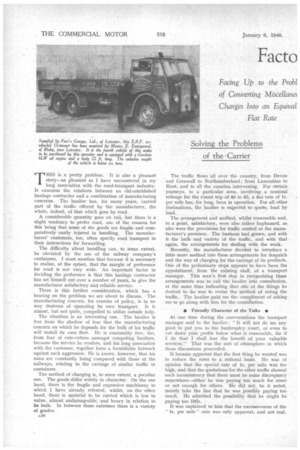A Rates Structure for All Forms of Transport
Page 40

If you've noticed an error in this article please click here to report it so we can fix it.
THE first memoranda dealing with the railway companies' demand for a "square deal " were presented to the Birmingham Chamber of Commerce on Monday last by the Railways and Transport Committee and the Road Traffic Section of the Chamber.
In dealing with the railways' application to the Minister of Transport, the memoranda state, it is recognized that the railway companies, are subject to a number of disabilities which call for redress, the extent and character of which have been under review on several occasions by the Council.
• Reference is made to the Minister of Transport's efforts, in January, 1933, to obtain practical proposals for the amendment of existing statutory restrictions. The Council approved a number of specific proposals, but progress upon the lines suggested was negatived by the railways themselves, which consistently supported the attitude indicated in paragraph 99 of the Final Report of the Royal Commission on Transport, as follows:— " When it came to the possibility of removing these disabilities, the companies had few suggestions to make to us. They informed us that it would be possible for Parliament to remove a large number of statutory disabilities to which they referred, but that such action would probably create confusion, and be strongly opposed by the trading interests. We were told that, from the railway companies' point of view, many of their disabilities could best be dealt with by the regulation of road transport."
Support for Road-transport Control.
Up to the time of the present application to the Minister, say the memoranda, this is a position which the railway companies have unwaveringly supported.
The Committee and Section of the Chamber find it impossible to support any proposal which envisages the total discontinuance of all statutory control over transport charges.
The memoranda then quote from a memorandum submitted, in 1932, by the Railway Companies Association to the Minister of Transport, and it is significant that, as a remedy against falling revenues, the railways dispose of this by saying " that under existing conditions no general increase in fares would bring in increased net revenue," and ". . . no general increase in rates, on the higher classes of traffic, would bring in increased revenue."
The ultimate solution of the present transport difficulties, say the memoranda, lies in the direction of a general co-ordination of the transport 334 facilities of the country, and the primary step in this direction involves the more adequate organization of the road-transport industry. • The views and recommendations in this connection are given in a memorandum prepared by the Railways Committee and the Road Section of the Chamber, entitled "The Coordination of Inland Transport" Retaining a Measure of Classification.
Dealing with the railway companies' request to be entirely freed from the obligation to classify their traffic, the memorandum says that the Committee and Section, as in 1937, are still firm in the conviction that some measure of classification is essential for all forms of transport. In these circumstances they feel that the co-ordination of transport would be better served by a revision and simplification of the existing railway classification.
For any successful form of co-ordination, says the memorandum, licences for road hauliers for longer periods are an essential preliminary. A closer approach to equality of conditions in the regulation of rates is another essential, as at present an " ad valorem " system applies in one case, and charges based " primarily on costs " in another. • Following on the memorandum presented to the Minister of Transport by the railways in 1932, .came the Road and Rail Traffic Act, of 193.9, and in the same year the Finance Act increased licence duties fourfold. Neither of these measures afforded any help towards unifying the basis of charging as between ad valorem—the rail system—and cost of service—the road system.
On the subject of the C-licensee, the memorandum says that the right of the trader to undertake his own transport under C licences, whether for long or short distances, must be retained undiminished.
Similarly, the trader must be free to use whatever form of transport seems to him to he the best suited to his requirements.
On the subject of service, the memorandum says that the suggestion made in some quarters that operators should be restricted to particular routes and charged with the duty of running regular services between fixed 'points, is unacceptable. Mobility of road transport, which is one of its primary assets, should not be restricted.
The agreement and enforcement of reasonable rates, says the memorandum, can be effective only when some controlling authority is vested with adequate powers.
On the subject of organization, the Committee and Section were agreed that an immediate problem for solution is the infusion of a greater degree of orderliness into the road-transport industry.
Bearing of Rates Upon Wage Fixation.
It appears opportune, says the memorandum, that, when machinery is being contemplated for the fixation of wages, regard should be paid to the more important question of the chargeable rates, and that machinery for their, regularization should be devised. , There should be at least a tentative rates structure for road transport, of such a character as to he effective in its primary capacity, and capable of co-ordination with the schedules of the competitive forms of transport.
The memorandum deals at considerable length with the subject of the Central Road Board and Area Boards as recommended in the Baillie Report, and outlines their constitution and duties,
With the agreement of Conference Rates—rates that are truly economic, being neither unduly high nor " cut " —a marked relaxation of licensing restrictions should follow. Each form of transport should be allowed to develop legitimately, concludes the memorandum, so as to be capable of rendering to the nation, in peace and war alike, the best possible service in each case. •












































































